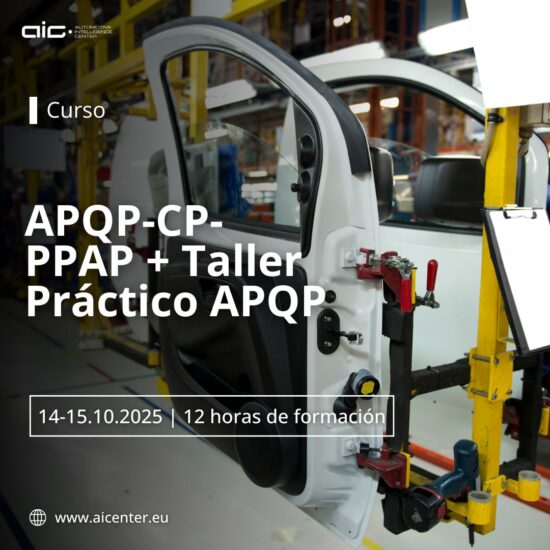
Course taught by our partner AIC – Automotive Intelligence Center
Advanced Product Quality Planning (APQP) is the methodology to be followed by the manufacturer or supplier to arrive at a finished product. It is very important in complex projects because it greatly facilitates communication between the parties involved, whether they are internal departments of an organization or customers and suppliers. The Production Part Approval Process (PPAP) is intended to ensure that all customer engineering records and specifications are clearly understood. Although similar to APQP, its focus is on the approval of a product that has already gone through the APQP process.
October, 14th and 15th
At AIC Academy (Amorebieta-Etxano)
LENGTH: 12 hours
To acquire the theoretical and practical knowledge to:
- Incorporate the APQP process in the organization.
- Elaborate the necessary documentation for the APQP process.
- Identify when to develop and how to use different types of control plans.
- Identify PPAP requirements.
- Obtain tools to incorporate the PPAP process in our relationships with customers.
- Develop the necessary PPAP documentation: The PSW (Part Submission Certificate).
Professionals from the automotive sector in the areas of quality, product engineering, processes and production.
APQP – Advanced Product Quality Planning.
- Introduction and fundamentals of APQP.
- Relationship with the IATF 16949:2016 standard.
Product quality planning cycle.
- Phase 1. Product planning and definition.
- Phase 2. Product design and development.
- Phase 3. Process design and development.
- Phase 4. Product and process validation.
- Phase 5. Feedback, evaluation and corrective actions.
CP – Control Plan
- Purpose and scope. Relationship to IATF 16949:2016.
- Sample size and frequency.
- Control methods. Reaction plans.
- Examples and practical exercise.
PPAP – Production Part Approval Process.
- Introduction and purpose.
- Relationship to IATF 16949:2016.
- Meaningful production.
- The 18 PPAP requirements.
- Customer notifications and PPAP levels.
- Detailed review of the PSW.
- Customer specific requirements.

